May 26, 2015
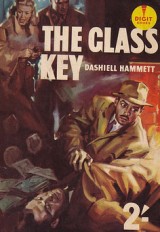 Okay, I’ve taken nearly a month since the Glass Key Part 1 post, and during that time haven’t been able to get this smashing Dashiell Hammett novel of politics and ka-pows out of my mind. So, that means – a second Cocktail Talk post on it. You are very lucky people (but not as lucky as when you actually read the book), cause it’s a swell, swell read, as the below demonstrates (in boozy fashion).
Okay, I’ve taken nearly a month since the Glass Key Part 1 post, and during that time haven’t been able to get this smashing Dashiell Hammett novel of politics and ka-pows out of my mind. So, that means – a second Cocktail Talk post on it. You are very lucky people (but not as lucky as when you actually read the book), cause it’s a swell, swell read, as the below demonstrates (in boozy fashion).
Lee Wilshire had returned to her table. She sat there with her cheeks between her fists, staring at the cloth.
Ned Beaumont sat down facing her. He said to the waiter: “Jimmy’s got a Manhattan that belongs to me. And I want some food. Eaten yet, Lee?”
“Yes,” she said without looking up. “I want a Silver Fizz.”
–Dashiell Hammett, The Glass Key
April 7, 2015
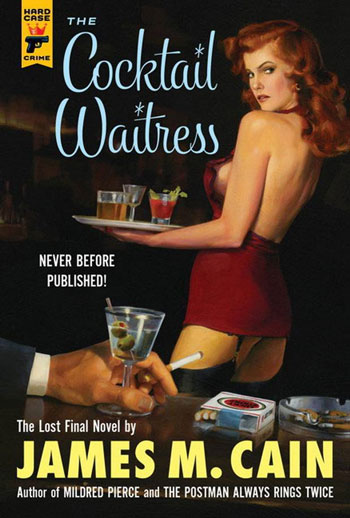 A lost novel by James M. Cain (James M. Cain!) came out a couple years ago, and I didn’t even realize it. Cause I am an idiot! But, that didn’t make me any less happy when I did find out, and when I found a copy I was ridiculously happy. Mr. Cain is of course one of the honest-and-true pulp and hardboiled masters, and so discovering The Cocktail Waitress, a lost novel of his, well, that’s treasure to a guy like me. And the book is fantastic, with many of the Cain hallmarks (sex, greed, stark, and characters that breathe), and with a fair amount of action in a bar called The Garden of Roses. In it, our main character learns a bit about what she’ll need to do besides delivering drinks.
A lost novel by James M. Cain (James M. Cain!) came out a couple years ago, and I didn’t even realize it. Cause I am an idiot! But, that didn’t make me any less happy when I did find out, and when I found a copy I was ridiculously happy. Mr. Cain is of course one of the honest-and-true pulp and hardboiled masters, and so discovering The Cocktail Waitress, a lost novel of his, well, that’s treasure to a guy like me. And the book is fantastic, with many of the Cain hallmarks (sex, greed, stark, and characters that breathe), and with a fair amount of action in a bar called The Garden of Roses. In it, our main character learns a bit about what she’ll need to do besides delivering drinks.
“First set-up is for the old-fashioned. You know what an old- fashioned is?”
“You mean the orange slices and cherries?”
“…Yeah, them.” He gave me a long look, then went on: “And for Martinis?”
“I turn the olives out in a bowl and stick toothpicks in them.”
“For Gibsons—”
“Onions, no toothpicks.”
“O.K. Now, on Manhattans—”
“Cherries.”
“No toothpicks if they have stems on them. But sometimes the wrong kind is delivered, and them without stems take picks. On Margaritas—”
“Salt? In a dish? And a lemon, gashed on one end, to spin the glasses in?”
“Speaking of lemon—”
“Twists? How many?”
“Many as three lemons make. Cut them thick, put them in a bowl, and on top put plenty ice cubes, so they don’t go soft on me. I hate soft twists.” He looked at me like I was a dancing horse or some other marvel. “You sure you never…?”
I explained: “My mother used to give parties, and my father fixed the drinks. I was Papa’s little helper.”
— James M. Cain, The Cocktail Waitress
March 17, 2015
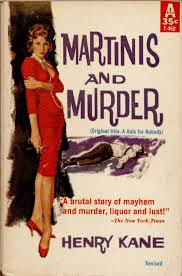 The cover blurb from the NYT review of this book says it all, “A brutal story of mayhem and murder, liquor and lust.” Okay, it doesn’t seem all that brutal today maybe as in 1947, but it does deliver on the murder, liquor, and lust, no doubt about that! Written by Henry Kane and starring a detective named Peter Chambers, Martinis and Murder is probably B level hard-boiled pulp action – not at the level of the masters, but not a bad little read. And as far as cocktail talking goes, this book is packed and overflowing with booze-y asides, varieties of imbibibles, and lots of general drinking. Oh, there’s a mystery, too, which gets solved in-between the drinks. Because the book’s so tipsy and happy about it, this is only going to be the first Cocktail Talk, of three! And there could have been more! Really!
The cover blurb from the NYT review of this book says it all, “A brutal story of mayhem and murder, liquor and lust.” Okay, it doesn’t seem all that brutal today maybe as in 1947, but it does deliver on the murder, liquor, and lust, no doubt about that! Written by Henry Kane and starring a detective named Peter Chambers, Martinis and Murder is probably B level hard-boiled pulp action – not at the level of the masters, but not a bad little read. And as far as cocktail talking goes, this book is packed and overflowing with booze-y asides, varieties of imbibibles, and lots of general drinking. Oh, there’s a mystery, too, which gets solved in-between the drinks. Because the book’s so tipsy and happy about it, this is only going to be the first Cocktail Talk, of three! And there could have been more! Really!
She touched a cord with a gold tassel and the butler came in.
‘Aperitif?’ she inquired and looked at me.
‘Manhattan,’ I said.
‘Manhattan, Alfred. And several Martinis, dry. Please serve them in the garden. Now, come along, Peter Chambers. And don’t disgrace me.’
–Henry Kane, Martinis and Murder
February 3, 2015
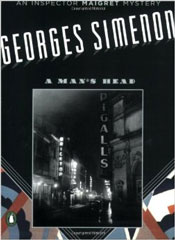 Not too long ago I had my first George Simenon Cocktail Talk post, and in that very post mentioned that I thought I’d probably have more – and I was right! I’ve read a few more Inspector Maigret books since then, most recently A Man’s Head. And it was a good yarn indeed, fast-paced, intriguing, nicely mysterious, and really tightly plotted. Everything you’d want (if what you want is a worthy book, that is). Also, a fair amount of the action takes place in bars, which I’m all for, as you might guess. The main bar is the American bar in the Cupole, where Maigret makes a sorta rare foray into cocktails.
Not too long ago I had my first George Simenon Cocktail Talk post, and in that very post mentioned that I thought I’d probably have more – and I was right! I’ve read a few more Inspector Maigret books since then, most recently A Man’s Head. And it was a good yarn indeed, fast-paced, intriguing, nicely mysterious, and really tightly plotted. Everything you’d want (if what you want is a worthy book, that is). Also, a fair amount of the action takes place in bars, which I’m all for, as you might guess. The main bar is the American bar in the Cupole, where Maigret makes a sorta rare foray into cocktails.
He heard someone call out.‘A Manhattan.’
And he said: ‘The same for me.’
He was not himself of the cocktail generation. Beer was more in his line. The barman pushed a dish of olives toward him, but he did not touch them.
—A Man’s Head, George Simenon
March 26, 2013
 It’s nice to know that the classics were full of Cocktail Talk. And nice to know that I’m still tappng into those great books, the Compleat Imbibers, those British compendiums of drink, wine, glassware, poetry, and so much more that everyone should pick up if they ever get a chance. If you don’t get a chance, well, read this quote:
It’s nice to know that the classics were full of Cocktail Talk. And nice to know that I’m still tappng into those great books, the Compleat Imbibers, those British compendiums of drink, wine, glassware, poetry, and so much more that everyone should pick up if they ever get a chance. If you don’t get a chance, well, read this quote:
Drinkers, such as Horace, were regularly mentioned in the New Year’s Honours. Indeed, Horace’s great ode on the defeat of Cleopatra begins, symbolically, with the words ‘Nunc est bibendum’: ‘Now for a drink.’ It is as if some patriotic American poet, the late Robert Frost perhaps, were to have celebrated the annihilation of an infinitely seductive female Mao tse Tung by demanding a Manhattan.
–Peter Dickinson, Love, Liquor, and Classical Learning, from The Compleat Imbiber 6
June 11, 2012
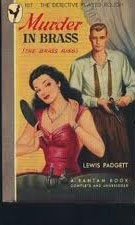 First and foremost, before the murder-and-drink-talk starts, let me apologize for the lack of posts last week and for probably the next couple. Things, as they say, have come up. Fun things, and things I may tell you about later (well, except the part about me running in a grass skirt through grass fields. Cause you probably don’t want that image). Anyway, excuse time=over. Now, on to Murder in Brass, by Lewis Padgett. Who I don’t know a lot about, except that he was two guys. I do know that the protagonist of this book, retired-ish detective Seth Coleman is (as the back of the book tells us): Rough! Tought! Terrific! The book has something to do with a guy who may or may not be running around knocking folks off. The “Brass” part has to do with his pops, who is dead and who was obsessed by brass. It was upstate New York and gold hadn’t been invented yet. Perhaps the best part of the book is when Mr Coleman (Rough! Tough! Terriffic!) goes into a diner with his alcoholically-minded sidekick to get a drink and finds out this spot doesn’t serve booze:
First and foremost, before the murder-and-drink-talk starts, let me apologize for the lack of posts last week and for probably the next couple. Things, as they say, have come up. Fun things, and things I may tell you about later (well, except the part about me running in a grass skirt through grass fields. Cause you probably don’t want that image). Anyway, excuse time=over. Now, on to Murder in Brass, by Lewis Padgett. Who I don’t know a lot about, except that he was two guys. I do know that the protagonist of this book, retired-ish detective Seth Coleman is (as the back of the book tells us): Rough! Tought! Terrific! The book has something to do with a guy who may or may not be running around knocking folks off. The “Brass” part has to do with his pops, who is dead and who was obsessed by brass. It was upstate New York and gold hadn’t been invented yet. Perhaps the best part of the book is when Mr Coleman (Rough! Tough! Terriffic!) goes into a diner with his alcoholically-minded sidekick to get a drink and finds out this spot doesn’t serve booze:
‘Take it easy,’ Bedarian said, seizing a menu. ‘Jesus. The place is dry.’
A bitter voice voice said, ‘Listen, bud, you know what a liquor license costs?’
The thin, sour man in the white apron stood over us, a pad and pencil ready. Wilma Bird said, ‘Mike doesn’t have to serve liquor. He’s got the best food in town.’
Mike made an unpleasant noise in his throat. ‘So what? I don’t have Martinis and Manhattans and Zombies and Pink Women–’
‘Pink Ladies,’ Bedarian corrected, touched in a sore spot.
‘Pink tootsie-rolls for all I know,’ Mike said somberly. ‘Fine name for a drink. A man ought to drink rye. Then he knows where he’s at. Women shouldn’t ought to drink at all. What’s yours?’
— Murder in Brass, Lewis Padgett
February 27, 2012
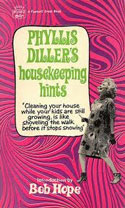 It’s Friday! Which means you should be thinking kick-up-my-heels and not clean-up-my-kitchen. But, but, but, with work schedules that are so packed, and weekdays that don’t seem to have a stitch of free time, often the weekends end up being a time to only shepherd the house back from chaos and into shape for the next week. Well, here’s an idea–track down a copy of Phyllis Diller’s Housekeeping Hints and get some advice on how to keep a house clean with minimal effort. Or, no effort at all. Cause Madam Diller is much more about the yuks than the sweeps, being a famous comedian from back a-ways. So, the book is full of suggestions like, “leave your sink full of dirty dishes. It’s a good way to cover up the dirty sink.” Which are perfect for Friday, when you should be thinking young, wild, and free and not detergent, elbow grease, and bleach. She also talks a lot about her penny-grasping husband Fang, which leads to the below line, which I love for some odd reason, and which ties the book in to the booze blog.
It’s Friday! Which means you should be thinking kick-up-my-heels and not clean-up-my-kitchen. But, but, but, with work schedules that are so packed, and weekdays that don’t seem to have a stitch of free time, often the weekends end up being a time to only shepherd the house back from chaos and into shape for the next week. Well, here’s an idea–track down a copy of Phyllis Diller’s Housekeeping Hints and get some advice on how to keep a house clean with minimal effort. Or, no effort at all. Cause Madam Diller is much more about the yuks than the sweeps, being a famous comedian from back a-ways. So, the book is full of suggestions like, “leave your sink full of dirty dishes. It’s a good way to cover up the dirty sink.” Which are perfect for Friday, when you should be thinking young, wild, and free and not detergent, elbow grease, and bleach. She also talks a lot about her penny-grasping husband Fang, which leads to the below line, which I love for some odd reason, and which ties the book in to the booze blog.
When we have guests, he puts a cherry in a glass of beer and calls it a Manhattan.
— Phyllis Diller, Phyllis Diller’s Housekeeping Hints
November 19, 2011
 It’s rare, in the mystery book genre, to find a protagonist that drinks. Oh, wait, you see that all the time. What’s really rare is a protagonist that writes poetry, or reads poetry, or reads at all, really. However, in Qiu Xiaolong’s wonderful Death of a Red Heroine, the main character, Chief Inspector Chen is a writer as well as a cop, and is always sprinkling in lines from classic Chinese poems into his conversations and thoughts. And, the mystery itself is good, while the setting and surroundings (late 80s China) are describing in a manner that’s both poetic and immersive. Add in a sidekick (Detective Yu) who’s got some sass in him and a whole host of intriguing surrounding characters (there’s even one called Overseas Chinese Lu) and intricate food descriptions and the following quote and you’ll be able to guess that I strongly suggest you read the book, for gosh sakes.
It’s rare, in the mystery book genre, to find a protagonist that drinks. Oh, wait, you see that all the time. What’s really rare is a protagonist that writes poetry, or reads poetry, or reads at all, really. However, in Qiu Xiaolong’s wonderful Death of a Red Heroine, the main character, Chief Inspector Chen is a writer as well as a cop, and is always sprinkling in lines from classic Chinese poems into his conversations and thoughts. And, the mystery itself is good, while the setting and surroundings (late 80s China) are describing in a manner that’s both poetic and immersive. Add in a sidekick (Detective Yu) who’s got some sass in him and a whole host of intriguing surrounding characters (there’s even one called Overseas Chinese Lu) and intricate food descriptions and the following quote and you’ll be able to guess that I strongly suggest you read the book, for gosh sakes.
Behind him, across Zhongshan Road, stood the Peace Hotel with its black-and-red pinnacled roof. He had fantastized about spending an evening there in the jazz bar, in Wang’s company, with the musicians doing a great job with their piano, horns, and drums, and the waiters, starched napkins over their arms, serving Bloody Marys, Manhattans, Black Russians . . .
—Death of a Red Heroine, Qiu Xiaolong
 Okay, I’ve taken nearly a month since the Glass Key Part 1 post, and during that time haven’t been able to get this smashing Dashiell Hammett novel of politics and ka-pows out of my mind. So, that means – a second Cocktail Talk post on it. You are very lucky people (but not as lucky as when you actually read the book), cause it’s a swell, swell read, as the below demonstrates (in boozy fashion).
Okay, I’ve taken nearly a month since the Glass Key Part 1 post, and during that time haven’t been able to get this smashing Dashiell Hammett novel of politics and ka-pows out of my mind. So, that means – a second Cocktail Talk post on it. You are very lucky people (but not as lucky as when you actually read the book), cause it’s a swell, swell read, as the below demonstrates (in boozy fashion).



























